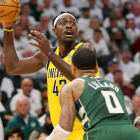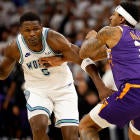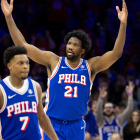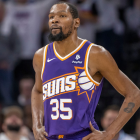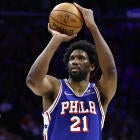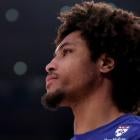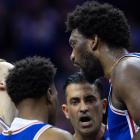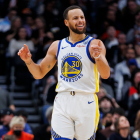TARRYTOWN, N.Y. -- After a recent practice, New York Knicks guard Tim Hardaway Jr. lamented his team's bad luck. If he hadn't suffered a stress injury in his left leg, if Kristaps Porzingis hadn't torn his ACL in his left knee and if they could have built on their early-season momentum, he wouldn't be looking forward to exit interview feedback right now. He does not regret saying the Knicks would make the playoffs back in October, even though they are now 28-53 on the final day of the regular season -- if they had been healthier, he believes they would be playing this weekend.
If Hardaway sounds surprisingly optimistic for someone in this position, it is because he had to learn the power of positivity when his career took a turn he never expected. Near the end of his fifth season in the league, Hardaway looked back on his toughest time as a professional: Being sent to the NBA Development League (now G League) in 2015. The experience helped harden him and put him in position to make good on the large contract he signed last summer to be a future cornerstone of the Knicks.
"I was in depression," Hardaway told CBS Sports. "I was in my room, dark every night, not wanting to talk to nobody, not going out with my friends, not doing anything, not having a great time. It was a lot of dark nights."
Atlanta Hawks assistant coach Charles Lee said Hardaway was bitter. The Hawks had acquired him on draft night, but decided he needed time to work on his game and his body before being part of their regular rotation. He had averaged 11.5 points in 24 minutes the previous season in New York and looked forward to showing everyone what he had been working on in the summer. Instead, he found himself with the Canton Charge at the beginning of December.
"I kind of was just like disappointed, wanted to get out there," Hardaway said, "because I just felt I didn't belong. And they sent me back down there about Christmas."
Hardaway joined the Austin Spurs for his second stint. This time, he played much better, and Lee said he was impressed with how he handled it. "Some guys would've wilted," Lee said. Hardaway now fondly remembers the players in Austin welcoming him to the team, even calling it a great experience.
"I had family, friends in town and I really wanted to be with them," he said. "When they sent me off, it was kind of heartbreaking. But I went down there with a chip on my shoulder."
Hardaway said that basketball was his way out of his depression. He focused on the game, and he talked to Lee and then-Hawks veterans Kyle Korver, Thabo Sefolosha and Al Horford about his situation.
"I can't thank those guys enough," Hardaway said. "It only made me a stronger and better person on and off the floor. I definitely overcame that adversity and I thank them."
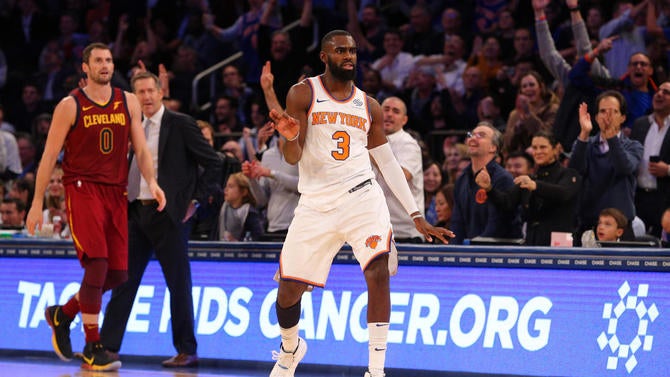
Hardaway knew his reputation after his first two seasons in the NBA: "A guy that runs the floor well, slasher, shoots the 3 ball, needs to work on his defense, needs to work on his ballhandling, pick-and-roll situations. And basically get back to having fun."
Atlanta's front office and coaching staff believed in Hardaway's potential, but wanted him to to recalibrate his game. There were proven wing players in front of him, and, if he was going to get minutes, he needed to be adequate on defense, learn to move without the ball and become a better passer. "It could have broken me down," Hardaway said, but he had no choice but to accept the challenge. His team was winning games without him, so he could not complain.
"They told me, hey, you're going to sit the first 25 games and we expect you to be ready after that,'" he said. "It was a tough pill to swallow."
The Hawks did not just make Hardaway collect DNP-CDs; they made him change his body. "I would be doing three-minute runs back-to-back," Hardaway said, recalling a brutal cardio workout: Run up and down the court as many times as you can for three minutes, rest for three minutes and then do it again. They wanted him to run up and down 28 or 29 times the first time and 26 or 27 on the second one, he said.
"Obviously being a competitor, I just wanted to get as much as I can," Hardaway said. "The first time I did it, I got 26 and a half, 27. And then the next time, I got like 25, 24 and a half. So I wasn't there yet. And it showed."
Hardaway followed a strict diet, drank only water and followed the kind of program NBA players can usually only do in the offseason. He did intense on-court workouts including full-court conditioning drills and ballhandling drills before the three-minute runs. Then, before games in which he would not play, he would lift weights.
Lee and Hardaway talked about being "elite" to the point that it "became a running joke," Lee said. "He'd be like, 'Dang, Charles, you're eating a salad?' I'm like, 'Yeah, I'm trying to be elite today.'" Lee and other Hawks coaches gave Hardaway blunt criticism, particularly on the defensive end.
"He was very flat-footed, slow to react, not letting his instincts take over defensively," Lee said. "Some of that was because of the condition he was in and some of it was because it was just a mindset. And he had to care more and become more accountable on that end. And he did, which was the reason why he was able to get more playing time."
Hardaway only ended up playing three games for Austin. He earned a backup role in the new year, and was a full-time starter at the end of his second season with the Hawks, the most efficient year of his career. Now he credits them for helping him understand what it means to be a professional.
Tim Hardaway Jr's 3⃣2⃣point 1st half! #Knickspic.twitter.com/WXtpJPmGvg
— NBA (@NBA) February 15, 2018
Atlanta would have liked to re-sign Hardaway last summer, but the Knicks swooped in with a four-year, $71 million contract that it declined to match. Back on the team that drafted him, he is an example of how to rebuild a career. Though he is just 26 years old, the youth of New York's roster makes him feel like a vet. He has given advice to the team's rookies, and, yes, he routinely pays for their meals.
Trey Burke, Hardaway's backcourt partner at Michigan, joined the team midseason after his own G League sojourn. The two have talked about their winding roads to this point and Burke thinks Hardaway is more motivated now that he can reflect on the low point of his career with clarity.
"Being able to fight through those dark experiences, those long nights, playing in the G League, knowing that you are an NBA player, it is a humbling experience," Burke said.
Hardaway is better at controlling his emotions than he was years ago, Burke said. He has always played with passion, but now that he's had his ups and downs -- and been instructed by the Hawks to tone down his outbursts and improve his body language -- he is able to channel his competitive spirit differently. Hardaway said he is no longer as hard on himself.
"Part of that whole power of positivity thing is don't waste your brain power, your ability to play, with these toxic thoughts," Lee said. "I think he really took that to heart."
This lesson can apply to off-the-court negativity, too. The moment he agreed to that contract, it was widely ridiculed. Hardaway tries to block out criticism, but understands it comes with the territory. The reaction taught him that "there is no win-win or lose-lose in a situation, everything is a medium," he said. His job. this season was to keep refining his game and playing with confidence.
"You've gotta prove to everybody, but at the same time have fun doing it," Hardaway said. "Have fun, don't lose what got you the contract. Don't lose that motivation and that fire and that desire that you had the previous season to allow that contract to bring you back down, allow everybody to bring you back down."
Hardaway is encouraged by the fact the Knicks were .500 and only half a game out of the playoffs at the end of the 2017 calendar year. He averaged a career-high 17.5 points and he knows where his shots will come from when Porzingis -- "the man out here" -- is back on the court. He knows New York has a high draft pick coming, expects development from its other young players and -- with his dark moments in the rearview -- likes to picture the bright lights of Madison Square Garden when it all comes together.
"Just hearing the Garden when KP went off; myself, when we were playing against the Wizards at home, when I had 32 in the first half, just how crazy it got," Hardaway said. "Last time I've seen the Garden get like that was when Melo had 62 points.
"Looking down to the future, when you're able to look up and say, we have these pieces together, if we add a piece here, if we add a piece there -- I'm not no GM or no president, but I do have that feeling. I do have that motivation to look at the future and say we have something working here."














